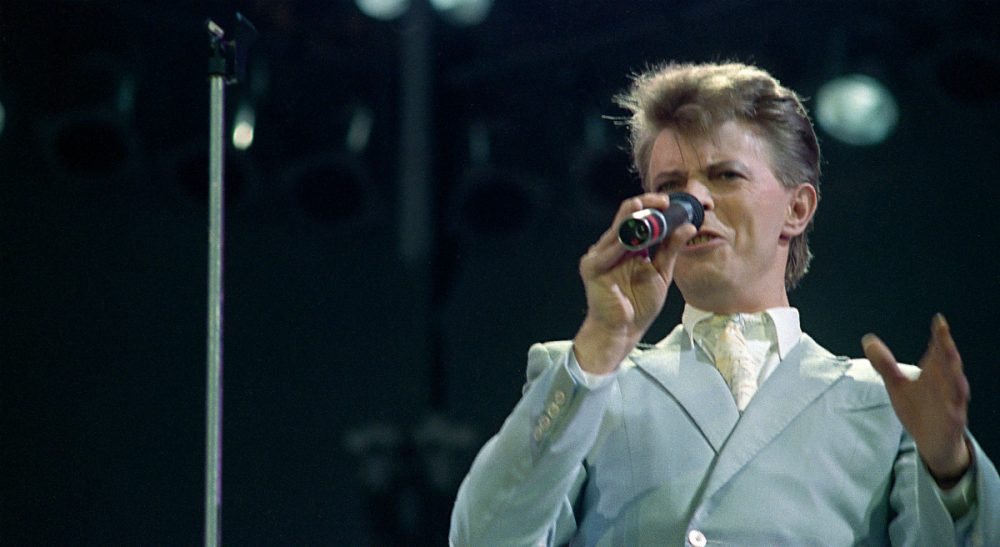Advertisement
'Turn And Face The Strange': An Appreciation Of David Bowie

In the summer of 1970, a 16-year-old with a brand new driver’s license sped down a rural road outside Ann Arbor, Michigan. I drove with one hand on the wheel of my mother’s turquoise 1965 Dodge Dart, the other holding a Newport cigarette, and the radio as loud as it would go. The sun was especially brilliant that day, but as I listened to "Space Oddity" (better known as “Major Tom”), my exhilaration was laced with some other feeling that I only later recognized as melancholy. David Bowie’s song about an astronaut “sitting in a tin can, far above the world" captured both the allure and peril of freedom. For an adolescent with now not just the dream but finally the means of leaving home, his story of drifting off course and “floating in a most peculiar way” was both beautiful and disturbing.
And that was the one constant in Bowie’s music. Over the course of many personas and musical styles — from the “glam rock” of Ziggy Stardust to the funk-infused “plastic soul” years, from the electronica of the late 1970s to the jazz-informed layered sound of his final album — David Bowie himself was consistently both beautiful and disturbing.
And so it went, with Bowie creating and shedding new styles, some of which resonated with my sensibility, some of which irritated it.
It took a long time for me to recognize that. Unlike many of those writing online tributes to the late musician, I was not a reliable fan.
While still in my youth, I’d adored "Changes." Faced with the imbecility of teachers and other grownups who seemed so intractably dense and immobile, I’d silently sing “And these children that you spit on/As they try to change their worlds/Are immune to your consultations/They're quite aware of what they're going through…”
The song, with its blend of world-weariness and reproach, was a private anthem. So naïve and wedded to peace, guitars and blue denim, I felt betrayed by the mid-1970s Bowie in eyeliner and a frilly harlequin jumpsuit, singing weird songs like "Starman." As if the shiny showiness wasn’t bad enough, I remember arguing to my friend Carl (who had embraced this new persona), Bowie had included strings in his music!
But then he released "Young American," and I heard the same kind of blistering poetry that Bob Dylan had abandoned. “She took his ring, took his babies,” Bowie sang. “It took him minutes, took her nowhere. Heaven knows, she'd have taken anything, but all night, she wants the young American.” The song’s great screaming sax lick and funky backup singers almost obscured the desperate lives he depicted. Almost. But behind the beat and the hook, were poignant lyrics that revealed a deep sympathy for working class longing. “Her bread-winner begs off the bathroom floor/We live for just these twenty years/Do we have to die for the fifty more?"
Then came the 1980s, a musical era for which I have barely mitigated scorn. Bowie partnered with Queen, whose histrionics I loathed, and once again I almost wrote him off. But that insinuating bass line in "Under Pressure," its bursts of scat singing, the mounting pathos of Bowie singing “Love dares you to care for the people on the edge of the night” — all that sophistication and restlessness made him impossible to dismiss.
And so it went, with Bowie creating and shedding new styles, some of which resonated with my sensibility, some of which irritated it.
But David Bowie wasn’t a mere chameleon. Beneath the sequins and the zoot suits and the glitter and the shades was such undeniable heart.
“I wanted to be a musician because it seemed rebellious,” Bowie said in a 2000 interview. “It seemed subversive, it felt like one could effect change to a form.” Indeed he did. But David Bowie wasn’t a mere chameleon. Beneath the sequins and the zoot suits and the glitter and the shades was such undeniable heart. Informing the eclecticism and growing dissonance in his music was a healthy disquiet. “I have nothing to do with the industry. I really have so little to do with it. The hub of my creativity comes from what I do and where I go,” he said. “I put myself in places that maybe I’ve never been before, or where I feel there’s a certain tension involved.”
That tension drove him to innovate, to bug us and move us and get under our skin in the best possible way. Perhaps nowhere was that more evident than in his new and final album released just days ago. "Blackstar" is both mournful and urgent, elegiac and savage.
Though not a constant fan, I will miss the burr of his restless attention.
So tonight, I’ll put on my red shoes and dance the blues.
